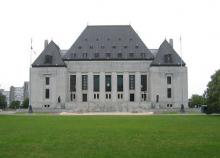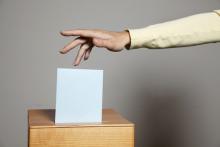neutrality

Every year, there are several hundred hate crimes committed against French Muslims. Of these, the majority of victims who have been physically assaulted are women in headscarves.
So what will be the impact of the Court of Justice’s ruling on an already beleaguered minority of headscarf-wearing Muslim women?

Canada’s Supreme Court has ruled that a small town in Quebec may not open its council meetings with prayer.
In a unanimous ruling April 15, Canada’s highest court ruled that the town of Saguenay can no longer publicly recite a Catholic prayer because it infringes on freedom of conscience and religion.
The case dates back to 2007, when a resident of Saguenay complained about public prayer at City Hall.
Just last year, a divided U.S. Supreme Court ruled that legislative bodies such as city councils could begin their meetings with prayer, even if it plainly favors a specific religion.
But the Canadian high court ruled that the country’s social mores have “given rise to a concept of neutrality according to which the state must not interfere in religion and beliefs. The state must instead remain neutral in this regard. This neutrality requires that the state neither favor nor hinder any particular belief, and the same holds true for non belief.”
The court said a nondenominational prayer is still religious in nature and would exclude nonbelievers.

FOR SEVERAL years now, a debate has raged over the issue of “net neutrality,” pitting media reformers, digital libertarians, and “content” companies such as Amazon and Netflix against old-school telecommunication giants such as AT&T and Comcast, with the Federal Communications Commission serving as an erratic referee.
Sometime early this year, the U.S. Court of Appeals for the District of Columbia may settle the question when it decides the case of Verizon vs. the FCC. If the court decides in favor of Verizon, big telecom companies will have won the right to decide what digital content we can receive, especially when it comes to video and other bandwidth-intense media.
Simply put, the issue in the Verizon case is whether broadband internet will follow the “common carrier” precedent applied to telephone lines and the electricity grid or the model of cable TV. The common carrier principle guarantees equal access to necessary public utilities. Applied to the internet, this has meant that service providers simply supply the fiber-optic cable or wireless spectrum, give equal access to all content providers, and charge the final recipient of the data (you and me) a fee that covers the cost of maintaining an adequate network.
In the cable TV business model, the provider controls the network of fiber optic cable and the content that goes over it. The cable company decides which channels are included in the basic package, which (like HBO) are purchased separately, and which will be unavailable at any price. If you want Al Jazeera instead of Fox News, too bad—it’s a take it or leave it package.

ELECTIONS CAN BE challenging times for nonprofit organizations, especially those of us deeply committed to social change. Sojourners is incorporated under the IRS Code as a 501(c)(3) organization, which means that we are prohibited from “directly or indirectly participating in, or intervening in, any political campaign on behalf of (or in opposition to) any candidate for elective public office.”
While scrupulously avoiding “intervening” in any partisan activities, we of course remain committed to our mission, which is to “articulate the biblical call to social justice, inspiring hope and building a movement to transform individuals, communities, the church, and the world.”
Those two poles—staying neutral in partisan campaigns, on the one hand, and working to build a movement to “change the world,” on the other—define the space within which we work, during an election year and at any other time.
We believe that elections matter—especially, from a biblical point of view, because they profoundly affect those that scripture calls the “least of these,” the likelihood of war or peace, and the health of our planet. (See Jim Wallis’ article “How to Choose a President” for more on that theme.) And many of us have strong convictions about which candidates, and which party’s approach, better reflect those biblical commitments.